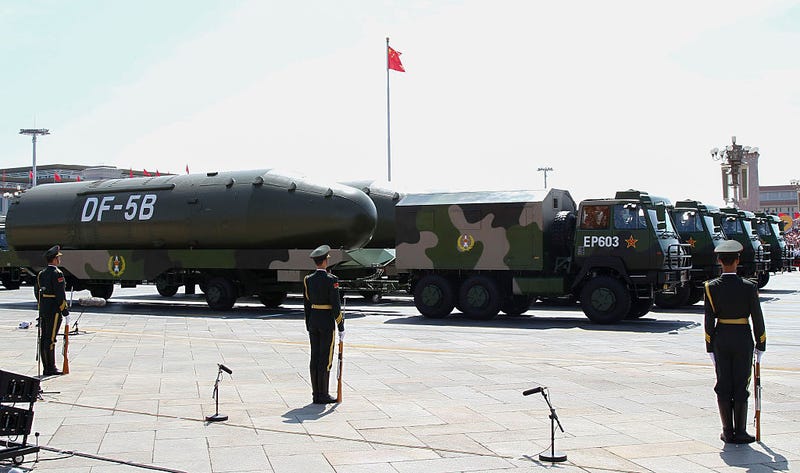China tests new extremely long-range missile that could muscle the US out of the South China Sea
Image shows the unnamed Chinese long range missile that could be a big problem for the US.
dafeng cao via Twitter
Chinese media
on Thursday indicated ongoing work on a new long range air-to-air missile that seems tailor-made to give the US Air Force problems when operating in the Pacific.
As Business Insider has previously covered, tensions between the US and China have been steadily ratcheting up over the last few years, and they have
spikedsince Donald Trump took office after breaking with decades of tradition and
taking a call from Taiwanese President Tsai Ing-wen.
Advertisement:
Photographs
posted on IHS Jane's and
on Chinese media show China's J-11B and J-16 fighters carrying an as-of-yet unnamed missile that Air force researcher Fu Qianshao told Chinese state-run media has a range of almost 250 miles - much further than current Chinese or even US capabilities.
"The successful development of this potential new missile would be a major breakthrough," Reuters reports Fu as telling a Chinese state-run newspaper.
According to Fu, the missile would enable the People's Liberation Army Air Force to "send a super-maneuverable fighter jet with very long-range missiles to destroy those high-value targets, which are the 'eyes' of enemy jets."
The US's airborne early warning and control planes (AWACS), basically giant flying radars, are the "eyes" Fu refers to. These planes can detect enemy movements and give targeting data to US fighter jets and bombers. Without them, the US Air Force faces a steep disadvantage.
US Navy E-3 Hawkeye's fly above Japan's Mt. Fuji.
Lt. J.G. Andrew Leatherwood/US Navy
This echoes analysis provided to Business Insider by
Australia Strategic Policy Institute's senior analyst
Dr. Malcolm Davis, who told Business Insider that "the Chinese are recognizing they can attack critical airborne support systems like AWACS and refueling planes so they can't do their job ... If you can force the tankers back, then the F-35s and other platforms aren't sufficient because they can't reach their target."
The new Chinese missile could grant the PLA Air Force the ability to cripple the US's airborne support infrastructure, and figures into a larger anti-access area denial (A2AD) strategy the Chinese have been developing for years now.
In combination with China's
massive, networked array of multiphase radarsacross artificial, militarized islands in the South China Sea, these missiles and the
coming J-20 strike aircraft show that China has leveraged multiple technologies to side-step the US's emerging stealth capabilities.
According to Davis, the US's advantage over adversaries like China has
faded over the last few years. "The calculus is changing because our adversaries are getting better," Davis said of China's emerging capabilities.
Older Chinese jets like the J-11s could be devastating with extremely long range missiles.
Xinhuanet
Davis said that adversaries like China and Russia are "starting to acquire information edge capabilities that [the US] has enjoyed since 1991 ... The other side had 20 years to think about counters to the Joint Strike Fighter (the F-35). Given the delays, by the time [the F-35] reaches full operation capability, how advanced are the Chinese and Russian systems going to be to counter it?"
As a possible solution, Davis recommended pairing fleets of
unmanned vehicleswith the F-35 to give the US a quantitative advantage as Chinese advances, like the new missile and plane, erode the US's qualitative edge.
"We don't have time to be leisurely about the fifth generation aircraft," said Davis. "The other side is not going to stand still."
http://nordic.businessinsider.com/c...ce=facebook.com&utm_campaign=buffer&r=US&IR=T


 .. turvallinen
.. turvallinen 


